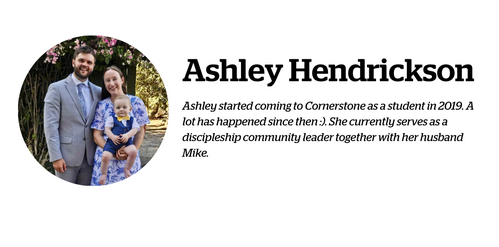Welcoming Others: Eternal Perspective in Transient Cities

By Ashley Hendrickson
For about 2 years, I lived and worked among Syrian and Afghan refugees who were fleeing violence in their home countries. Almost always, these families and individuals were in transition. Many were just passing through, on their way to somewhere that they hoped would be more welcoming. Others stayed for a few years but never truly settled, as legal status, fair work, healthcare, and schools for their children were nearly impossible to secure. On multiple occasions, women I had built relationships with would leave without a word—their friends reporting back that a smuggler had finally found a window to send them out over the sea.
Ministry in this environment was not straightforward. We lived in our city to help refugees walk in the fullness of life found in the gospel—including forgiveness of sin, knowledge of God, relationship with Jesus Christ, physical wholeness, freedom, dignity, thriving community, and hope for the future. We approached all of these things with a long-term, developmental perspective, yet we often didn’t get to see what happened to the seeds we
planted.
Los Angeles is a very different environment, but I’ve noticed some of the same dynamics. Many move to LA for school, a new job, or a certain dream, only to move again after a little while. I often hear friends at Cornerstone say that we feel like a new church every handful of years! For those that stay, it can seem tiring to keep starting new relationships, difficult to build depth long-term, and discouraging to not always see fruit where we have planted. If we let these feelings lead us, we can be tempted to only welcome people conditionally (based on their plans to stay), refrain from deep relationships with newcomers, or fall victim to unloving thoughts or emotions when people leave.
To joyfully, generously, and restfully live on mission in communities where people are transient, we need a truly eternal perspective. Over time, God has given me a few practical anchors that have helped with this:
1. Celebrating God’s purpose and heart for people. Scripture tells us that the central theme of history is God’s plan to bring all things together in Christ (Eph. 1:7-10). This purpose is redemptive, universal, and lavish! Remembering and celebrating God’s purpose motivates me with joy and provides an eternal, global vision that strengthens me in places and relationships that would otherwise feel small or temporary from my limited perspective.
2. Reminding myself that God has empowered me to welcome others. Especially when my personality or mood is less inclined toward welcoming others, I should return to the truth that God welcomed me into his own family and therefore I am called to welcome others. As Peter writes, “You are a chosen race, a royal priesthood, a holy nation, a people for his own possession, that you may proclaim the excellencies of him who called you out of darkness into his marvelous light” (1 Pet. 2:9). This God-given power and conviction helps me overcome the fears, passivity, or discomforts I might feel when welcoming others.
3. Recognizing how God ministers to me through other believers. God has called me to serve, but he has also called me to receive from the people he has placed around me. This motivates me to invite even the freshest faces close, because when I welcome others into my life, I welcome God’s ministry to me through them. Paul writes, “To each is given the manifestation of the Spirit for the common good” (1 Cor. 12:7). And Peter exhorts us, “As each has received a gift, use it to serve one another, as good stewards of God’s varied grace” (1 Pet. 4:10). I don’t want to miss out on how God might use someone else to build me up!
4. Counting on God’s unchanging, faithful character and his ongoing commitment to grace. When God proclaimed who he was to Moses, he declared himself to be, “The Lord, the Lord, a God merciful and gracious, slow to anger, and abounding in steadfast love and faithfulness” (Exod. 34:6). Because of this unchanging character, God has promised that his purpose of grace will go forward in history (Rom. 9:16). While he has invited me to participate in his desire for all people to come to know him (1 Tim. 2:3–6; 2 Pet. 3:9), he is ultimately the one who will complete this work (1 Cor 3:6). These truths allow me to entrust the effort, outcomes, and timing of my relationships (especially ministry focused relationships) to the Lord.
This summer, I was really encouraged to see our discipleship community live out this kind of empowering, unconditional welcome. We had three new people join us who we knew weren’t going to be around for very long. But everyone made an effort to welcome them into our church family as fully as possible—inviting them to events, including them in conversations, and allowing themselves to know them and be known by them. The fruit of this was amazing. Our group got to receive from the giftings of others and witness God’s heart of invitation and fellowship together in our community. One girl expressed that because of Cornerstone’s welcome, she got to see more of Jesus this summer. And all three new friends brought others (including non-believers) to church, extending the welcome they had received!
As we enter our fall season of welcome as a church family, I hope something from these words can serve as an encouragement to others. Because of the gracious, redemptive heart of our God, welcoming others—even in transient places—is a joyful, beautiful, and restful endeavor!
Ministry in this environment was not straightforward. We lived in our city to help refugees walk in the fullness of life found in the gospel—including forgiveness of sin, knowledge of God, relationship with Jesus Christ, physical wholeness, freedom, dignity, thriving community, and hope for the future. We approached all of these things with a long-term, developmental perspective, yet we often didn’t get to see what happened to the seeds we
planted.
Los Angeles is a very different environment, but I’ve noticed some of the same dynamics. Many move to LA for school, a new job, or a certain dream, only to move again after a little while. I often hear friends at Cornerstone say that we feel like a new church every handful of years! For those that stay, it can seem tiring to keep starting new relationships, difficult to build depth long-term, and discouraging to not always see fruit where we have planted. If we let these feelings lead us, we can be tempted to only welcome people conditionally (based on their plans to stay), refrain from deep relationships with newcomers, or fall victim to unloving thoughts or emotions when people leave.
To joyfully, generously, and restfully live on mission in communities where people are transient, we need a truly eternal perspective. Over time, God has given me a few practical anchors that have helped with this:
1. Celebrating God’s purpose and heart for people. Scripture tells us that the central theme of history is God’s plan to bring all things together in Christ (Eph. 1:7-10). This purpose is redemptive, universal, and lavish! Remembering and celebrating God’s purpose motivates me with joy and provides an eternal, global vision that strengthens me in places and relationships that would otherwise feel small or temporary from my limited perspective.
2. Reminding myself that God has empowered me to welcome others. Especially when my personality or mood is less inclined toward welcoming others, I should return to the truth that God welcomed me into his own family and therefore I am called to welcome others. As Peter writes, “You are a chosen race, a royal priesthood, a holy nation, a people for his own possession, that you may proclaim the excellencies of him who called you out of darkness into his marvelous light” (1 Pet. 2:9). This God-given power and conviction helps me overcome the fears, passivity, or discomforts I might feel when welcoming others.
3. Recognizing how God ministers to me through other believers. God has called me to serve, but he has also called me to receive from the people he has placed around me. This motivates me to invite even the freshest faces close, because when I welcome others into my life, I welcome God’s ministry to me through them. Paul writes, “To each is given the manifestation of the Spirit for the common good” (1 Cor. 12:7). And Peter exhorts us, “As each has received a gift, use it to serve one another, as good stewards of God’s varied grace” (1 Pet. 4:10). I don’t want to miss out on how God might use someone else to build me up!
4. Counting on God’s unchanging, faithful character and his ongoing commitment to grace. When God proclaimed who he was to Moses, he declared himself to be, “The Lord, the Lord, a God merciful and gracious, slow to anger, and abounding in steadfast love and faithfulness” (Exod. 34:6). Because of this unchanging character, God has promised that his purpose of grace will go forward in history (Rom. 9:16). While he has invited me to participate in his desire for all people to come to know him (1 Tim. 2:3–6; 2 Pet. 3:9), he is ultimately the one who will complete this work (1 Cor 3:6). These truths allow me to entrust the effort, outcomes, and timing of my relationships (especially ministry focused relationships) to the Lord.
This summer, I was really encouraged to see our discipleship community live out this kind of empowering, unconditional welcome. We had three new people join us who we knew weren’t going to be around for very long. But everyone made an effort to welcome them into our church family as fully as possible—inviting them to events, including them in conversations, and allowing themselves to know them and be known by them. The fruit of this was amazing. Our group got to receive from the giftings of others and witness God’s heart of invitation and fellowship together in our community. One girl expressed that because of Cornerstone’s welcome, she got to see more of Jesus this summer. And all three new friends brought others (including non-believers) to church, extending the welcome they had received!
As we enter our fall season of welcome as a church family, I hope something from these words can serve as an encouragement to others. Because of the gracious, redemptive heart of our God, welcoming others—even in transient places—is a joyful, beautiful, and restful endeavor!

